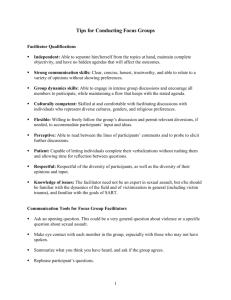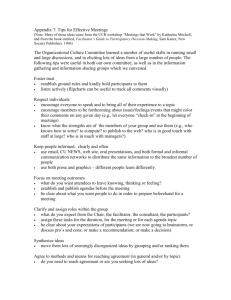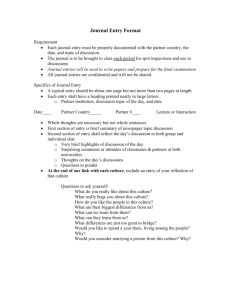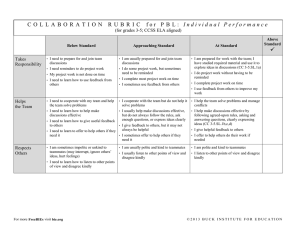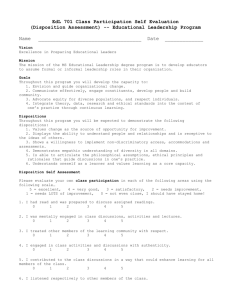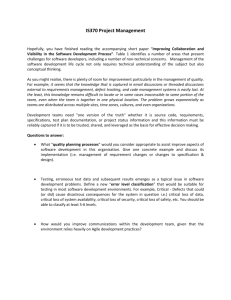Terri Phoenix Director
advertisement
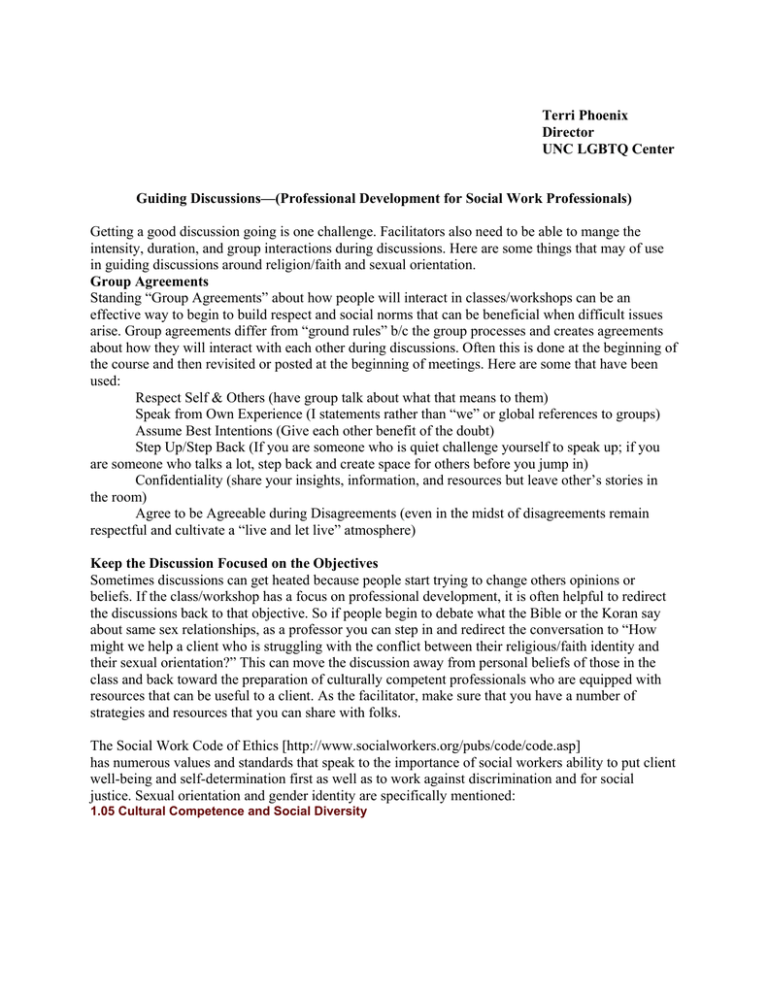
Terri Phoenix Director UNC LGBTQ Center Guiding Discussions—(Professional Development for Social Work Professionals) Getting a good discussion going is one challenge. Facilitators also need to be able to mange the intensity, duration, and group interactions during discussions. Here are some things that may of use in guiding discussions around religion/faith and sexual orientation. Group Agreements Standing “Group Agreements” about how people will interact in classes/workshops can be an effective way to begin to build respect and social norms that can be beneficial when difficult issues arise. Group agreements differ from “ground rules” b/c the group processes and creates agreements about how they will interact with each other during discussions. Often this is done at the beginning of the course and then revisited or posted at the beginning of meetings. Here are some that have been used: Respect Self & Others (have group talk about what that means to them) Speak from Own Experience (I statements rather than “we” or global references to groups) Assume Best Intentions (Give each other benefit of the doubt) Step Up/Step Back (If you are someone who is quiet challenge yourself to speak up; if you are someone who talks a lot, step back and create space for others before you jump in) Confidentiality (share your insights, information, and resources but leave other’s stories in the room) Agree to be Agreeable during Disagreements (even in the midst of disagreements remain respectful and cultivate a “live and let live” atmosphere) Keep the Discussion Focused on the Objectives Sometimes discussions can get heated because people start trying to change others opinions or beliefs. If the class/workshop has a focus on professional development, it is often helpful to redirect the discussions back to that objective. So if people begin to debate what the Bible or the Koran say about same sex relationships, as a professor you can step in and redirect the conversation to “How might we help a client who is struggling with the conflict between their religious/faith identity and their sexual orientation?” This can move the discussion away from personal beliefs of those in the class and back toward the preparation of culturally competent professionals who are equipped with resources that can be useful to a client. As the facilitator, make sure that you have a number of strategies and resources that you can share with folks. The Social Work Code of Ethics [http://www.socialworkers.org/pubs/code/code.asp] has numerous values and standards that speak to the importance of social workers ability to put client well-being and self-determination first as well as to work against discrimination and for social justice. Sexual orientation and gender identity are specifically mentioned: 1.05 Cultural Competence and Social Diversity (a) Social workers should understand culture and its function in human behavior and society, recognizing the strengths that exist in all cultures. (b) Social workers should have a knowledge base of their clients’ cultures and be able to demonstrate competence in the provision of services that are sensitive to clients’ cultures and to differences among people and cultural groups. (c) Social workers should obtain education about and seek to understand the nature of social diversity and oppression with respect to race, ethnicity, national origin, color, sex, sexual orientation, gender identity or expression, age, marital status, political belief, religion, immigration status, and mental or physical disability. Additionally, facilitators/instructors can refer to specific policy statements such as the following regarding same sex marriage: http://www.socialworkers.org/diversity/lgb/062804.asp The National Board of Directors of the National Association of Social Workers (NASW) reaffirms the Association's support for same-sex marriages, and strongly opposes any attempt to pass federal legislation or amend the United States Constitution to discriminate against same-sex couples or prohibit governmental recognition of these relationships. Conversion therapy: http://www.socialworkers.org/diversity/lgb/reparative.asp Thus, the focus of discussion could be redirected by a facilitator/instructor to preparing professionals who are knowledgeable about LGBTQ communities and resources that will help clients explore their own beliefs around religion and spirituality (including finding LGBTQ-affirming congregations, temples, synagogues, mosques, or covens in their community). Add Complexity to the Discussion Often conversations or debates get constructed around a binary of either/or when in reality there are multiple views on a subject. As the facilitator, you can add to the discussion and encourage learning and critical thinking by presenting mulitple views or materials or adding views/materials that aren’t being represented in the class/workshop. In a debate about religion and sexuality, one could have ready information, books, pamphlets, or websites that present varying viewpoints. Intensity of disagreement People may have intense or strong emotions on particular subjects. As a facilitator you want to allow discussion to have its natural course, however, if you sense that emotions are getting too intense you may step in to diffuse the situation. Phrases such as “This is a topic about which people hold strong emotions” or “This is a subject where people often disagree strongly” can help make the disagreements among group members seem less personal. Facilitators can also remind people of the group agreements to be respectful and to disagree with ideas expressed rather than the person expressing them. Summarize and recognize all positions before closing a discussion in which there have been strong emotions and conflicting positions. Remember to remain neutral! Closing discussions Allow discussions to last as long as they seem to be beneficial to the majority of participants in the group. It is usually time to wrap up a discussion when: (a) only a few participants are contributing to the discussion, (b) participants are fidgeting or ‘zoning out’, or (c) the same points are being repeated without any new twist or angle. When you see it is time to close a discussion, summarize the major points that arose during the discussion and provide a few final thoughts and relevant resources if folks want to pursue additional information about the topic. If you don’t have resources at hand, you can send them out via an email or bring them to the next class meeting or workshop session.
